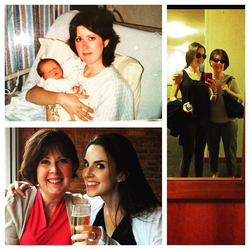Siobhan Pattwell

Siobhan Pattwell
In 2006 Pattwell graduated from Lafayette College, Easton, PA with a bachelor's degree in Neuroscience where she studied from 2002- 2006. Having continued her further education, she received a doctoral degree in Neuroscience from Weill Graduate School of Medical Sciences, Cornell University, NY in 2012. Before receiving her Ph.D. degree, she attended Cornell University between 2006 and 2012. [1][5] [6] **
Career and Research
Dr. Siobhan Pattwell has worked as a postdoctoral research fellow at Weill Cornell Medical Centre for about 2 years from January 2012- September r 2013. Starting from 2013 she has been working for Fred Hutchinson Cancer Research Center and is still conducting her research there. Her research spans such areas as neurodevelopment, molecular and genetic events implicated in normal and abnormal neural development, brain chemistry changes during adolescence, the development of the brain, particularly the neural circuits associated with fear, anxiety, and post-traumatic stress disorder using mice as a model. etc. She's especially interested in how these change over time as the mouse grows older. She also wants to investigate the molecular pathways involved in brain tumors and neural cancers. The current phase of Siobhan Pattwell’s research employs genetic mouse models to explore how variations of common neural receptors contribute to the development of particular cells and structures within the brain. Through exploring developmental, behavioral, and molecular aspects of both normal and aberrant neural plasticity, her research seeks to better understand the developing brain. She's been published in Science, the Proceedings of the National Academy of Sciences, and The Journal of Neuroscience.
"With a background in neuroscience, I have long been interested in the brain's capacity for change - both in normal and abnormal plasticity. Combining my interests in neuroscience and cancer, I am now utilizing mouse models of glioma to study how intrinsic properties of specific glioma subtypes, particularly GBM, prohibit successful treatment outcomes. By exploring the role of growth factor receptors in brain tumor development, I hope to gain a better understanding of what makes certain tumors more aggressive and subsequently treatment resistant." [1]
Siobhan Pattwell [1]
Achievements
Dr. Siobhan Pattwell is a postdoctoral fellow at the Sackler Institute of Graduate Biomedical Science mentored by Dr. B.J. Casey, director of the Sackler Institute at Weill Cornell, the Sackler Professor of Developmental Psychobiology and professor of psychology in psychiatry. She and her colleague Dr. Francis S. Lee, professor of psychiatry and professor of pharmacology, was selected by Forbes Magazine as one of the top 30 scientists under 30 years of age. Dr. Pattwell was honored for her research into brain chemistry changes during adolescence. Her research may explain why the incidence of anxiety disorders spikes during the years prior to and during teen years.
Dr. Siobhan Pattwell and Dr. Deqiang Jing, assistant professor of neurobiology and psychiatry, were two of more than 200 researchers to receive National Alliance for Research on Schizophrenia and Depression Young Investigator Grants from the Brain and Behavior Research Foundation. Dr. Pattwell will receive $60,000 over the course of two years to identify windows of maximal opportunity for therapeutic interventions that are tailored to appropriate individuals at the most appropriate time. She hopes to do this by delineating age-specific variation in the regulation of fear responses that are at the very core of therapeutics for anxiety disorders. She will perform parallel mouse and human studies to investigate the developmental role of reconsolidation update on the erasure of conditioned-cued and contextual memories. Similarly, Dr. Jing will also receive $60,000 over the course of two years to test the hypothesis that deficiency of a gene called SLITRK5 leads to OCD-like behaviors as a result of the altered forms of the synapse, the site where brain-cell communication takes place. Dr. Jing will include detailed analyses of the role Slitrk5 in synapse formation in vitro and in further animal studies. The Brain and Behavior Research Foundation is dedicated to identifying the causes, improving treatments and developing prevention strategies for mental illnesses.
Personal life
She loves shopping, running, puppies and cooking. She's also a born and bred Jersey girl who happens to be obsessed with country music. According to an article posted by the Businessinsider.com in February 2013, Dr. Pattwell was named 27thsexiest scientist in the US out of 50 presented.
Publications
Pattwell, S. S., Liston, C., Jing, D. Q., Ninan, I., Yang, R. R., Casey, B. J., Deisseroth, K., Lee, F. S. Dynamic changes in neural circuitry during adolescence are associated with persistent attenuation of fear memories. (2016) Nature Communications, 7: 11475. PMCID: PMC4890178 [1]
Pitter, K. L., Tamagno, I., Hosni-Ahmed, A., Pattwell, S. S., Donnola, S., Dai, C., Ozawa, T., Chang, M., Chan, T. A., Beal, K., Bishop, A. J., Barker, C. A., Jones, T. S., Hentschel, B., Gorlia, T., Schlegel, U., Stupp, R., Weller, M., Holland, E. C., Hambardzumyan, D. (2016) Corticosteroids compromise survival in glioblastoma. Brain, PMID: 27020328 [1]
Halliday, J., Helmy, K., Pattwell, S. S., Pitter, K. L., Laplant, Q., Ozawa, T., Holland, E. C. (2014) In vivo radiation response of proneural glioma characterized by protective p53 transcriptional program and proneural-mesenchymal shift. PNAS, 11 [1]





